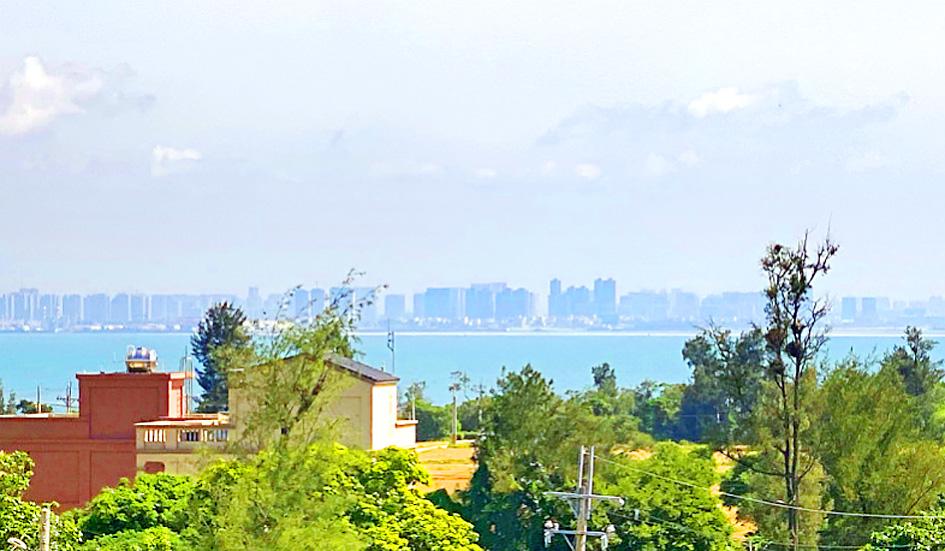Critics accused Taipei Mayor Ko Wen-je (柯文哲) of being oblivious to national security concerns after he proposed constructing a bridge to link Kinmen and China’s Xiamen (廈門).
Ko, who is also the Taiwan People’s Party (TPP) chairman, made the proposal when presiding over the opening ceremony of the party’s office in Kinmen on Saturday.
He said the bridge could solve Kinmen’s population, electricity and garbage problems, as well as serve as a shortcut for leaving or entering Taiwan without traveling via Taipei International Airport (Songshan airport).

Photo: Taipei Times
He also proposed building a hospital in Kinmen to attract people who are seeking medical treatment in Taiwan.
“Try it first and deal with the problems if they occur,” he said in response to national security concerns.
Independent Taipei City Councilor Lin Ying-meng (林穎孟) accused Ko of speaking for China, which she said falsely claimed the Taiwan Strait as “China’s inner sea” on Thursday.
Ko’s idea could pose “serious threats to Taiwan regarding diplomacy and national security,” Lin said.
A national security official who wished to remain anonymous asked whether Ko’s proposal was made rashly without considering national security or was catering to Chinese President Xi Jinping (習近平).
Kinmen would be completely subject to China if a bridge were built, as the People’s Liberation Army (PLA) could occupy Kinmen and put Taiwan in danger of being annexed, they said.
Democratic Progressive Party (DPP) Legislator Wang Mei-hui (王美惠) denounced the proposal as “giving Kinmen away to China,” while DPP Legislator Lin Chun-hsien (林俊憲) asked: “Why does Ko want to risk everything by building a bridge to open up for an invasion by the PLA ?”
Cross-Strait Policy Association secretary-general Wang Chih-sheng (王智盛) said that Ko’s proposal was either ignorant or oblivious to national security issues, which showed that the TPP lacks a central idea regarding Taiwan’s value.
“If a war breaks out, the PLA could quickly advance into Kinmen, which is the first target, before China’s full military assault against Taiwan... Ko is offering the ‘Trojan Horse’ scheme for China to take over Kinmen,” Taiwan Statebuilding Party spokesman Chang Po-yang (張博洋) said.
Ko yesterday said the proposed bridge could benefit economic cooperation between Kinmen and Taiwan proper, as it would eliminate the need for Taiwan Power Co (台電) to allocate an annual subsidy of NT$2 billion (US$67.25 million) to transport fuel to Kinmen for power generation, adding that buying electricity from Xiamen could save NT$15 per kilowatt-hour.
The bridge could further facilitate the “small three links,” which President Tsai Ing-wen (蔡英文) touted when she headed the Mainland Affairs Council, he said.
The comment that a bridge would allow the PLA to easily launch an attack shows “a lack of backbone,” Ko said.
“Why haven’t they thought of it the other way around — that it would be easier for Taiwan’s military to reconquer mainland China?” he said.
Additional reporting by Jason Pan

NATIONAL SECURITY THREAT: An official said that Guan Guan’s comments had gone beyond the threshold of free speech, as she advocated for the destruction of the ROC China-born media influencer Guan Guan’s (關關) residency permit has been revoked for repeatedly posting pro-China content that threatens national security, the National Immigration Agency said yesterday. Guan Guan has said many controversial things in her videos posted to Douyin (抖音), including “the red flag will soon be painted all over Taiwan” and “Taiwan is an inseparable part of China,” while expressing hope for expedited “reunification.” The agency received multiple reports alleging that Guan Guan had advocated for armed reunification last year. After investigating, the agency last month issued a notice requiring her to appear and account for her actions. Guan Guan appeared as required,

A strong cold air mass is expected to arrive tonight, bringing a change in weather and a drop in temperature, the Central Weather Administration (CWA) said. The coldest time would be early on Thursday morning, with temperatures in some areas dipping as low as 8°C, it said. Daytime highs yesterday were 22°C to 24°C in northern and eastern Taiwan, and about 25°C to 28°C in the central and southern regions, it said. However, nighttime lows would dip to about 15°C to 16°C in central and northern Taiwan as well as the northeast, and 17°C to 19°C elsewhere, it said. Tropical Storm Nokaen, currently

‘NATO-PLUS’: ‘Our strategic partners in the Indo-Pacific are facing increasing aggression by the Chinese Communist Party,’ US Representative Rob Wittman said The US House of Representatives on Monday released its version of the Consolidated Appropriations Act, which includes US$1.15 billion to support security cooperation with Taiwan. The omnibus act, covering US$1.2 trillion of spending, allocates US$1 billion for the Taiwan Security Cooperation Initiative, as well as US$150 million for the replacement of defense articles and reimbursement of defense services provided to Taiwan. The fund allocations were based on the US National Defense Authorization Act for fiscal 2026 that was passed by the US Congress last month and authorized up to US$1 billion to the US Defense Security Cooperation Agency in support of the

PAPERS, PLEASE: The gang exploited the high value of the passports, selling them at inflated prices to Chinese buyers, who would treat them as ‘invisibility cloaks’ The Yilan District Court has handed four members of a syndicate prison terms ranging from one year and two months to two years and two months for their involvement in a scheme to purchase Taiwanese passports and resell them abroad at a massive markup. A Chinese human smuggling syndicate purchased Taiwanese passports through local criminal networks, exploiting the passports’ visa-free travel privileges to turn a profit of more than 20 times the original price, the court said. Such criminal organizations enable people to impersonate Taiwanese when entering and exiting Taiwan and other countries, undermining social order and the credibility of the nation’s